What Is Sanity?
Lived experience stories + original research and analysis = Sanity
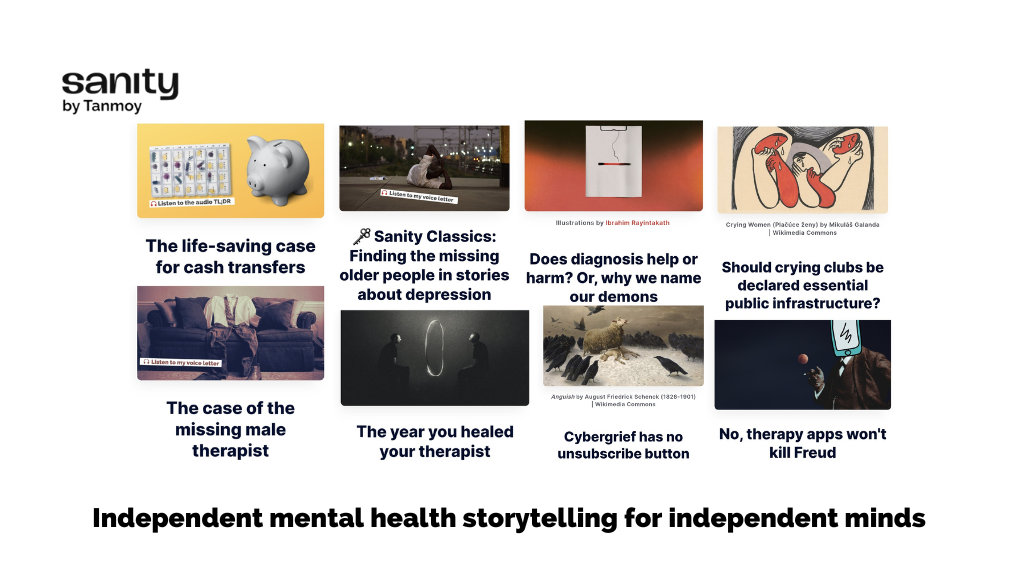
Sanity is an independent mental health storytelling platform, born out of my personal experience of living with chronic and life-threatening mental health conditions. I am passionate about documenting the complex and often ignored realities of the mental health movement in low- and middle-income countries. My work here is 100% reader-funded and ad-free.
Please note: I am not a 'media company', just one guy in love with the beauty of lived experience-based storytelling. I am not a qualified mental health professional either, and nothing on this website should be construed as mental health advice.
Every week, I send subscribers up to two emails with in-depth original stories plus handpicked recommendations from the exciting world of mental health. I also host Raw, a podcast centred on lived experiences; new episodes air monthly and are exclusively available to paying subscribers before the rest of the world. [Update as of May 2022: the podcast is now on pause because it proved too much work and my readers gave me the permission to take it a wee easy until I can afford help.]
Here's some backstory. When I told an ex-colleague I’d decided to call my platform 'Sanity by Tanmoy', she said it sounded like a perfume brand. Amen! I thought. We need all the help we can get to cope with the enormous stink circa 2020-21 has produced.
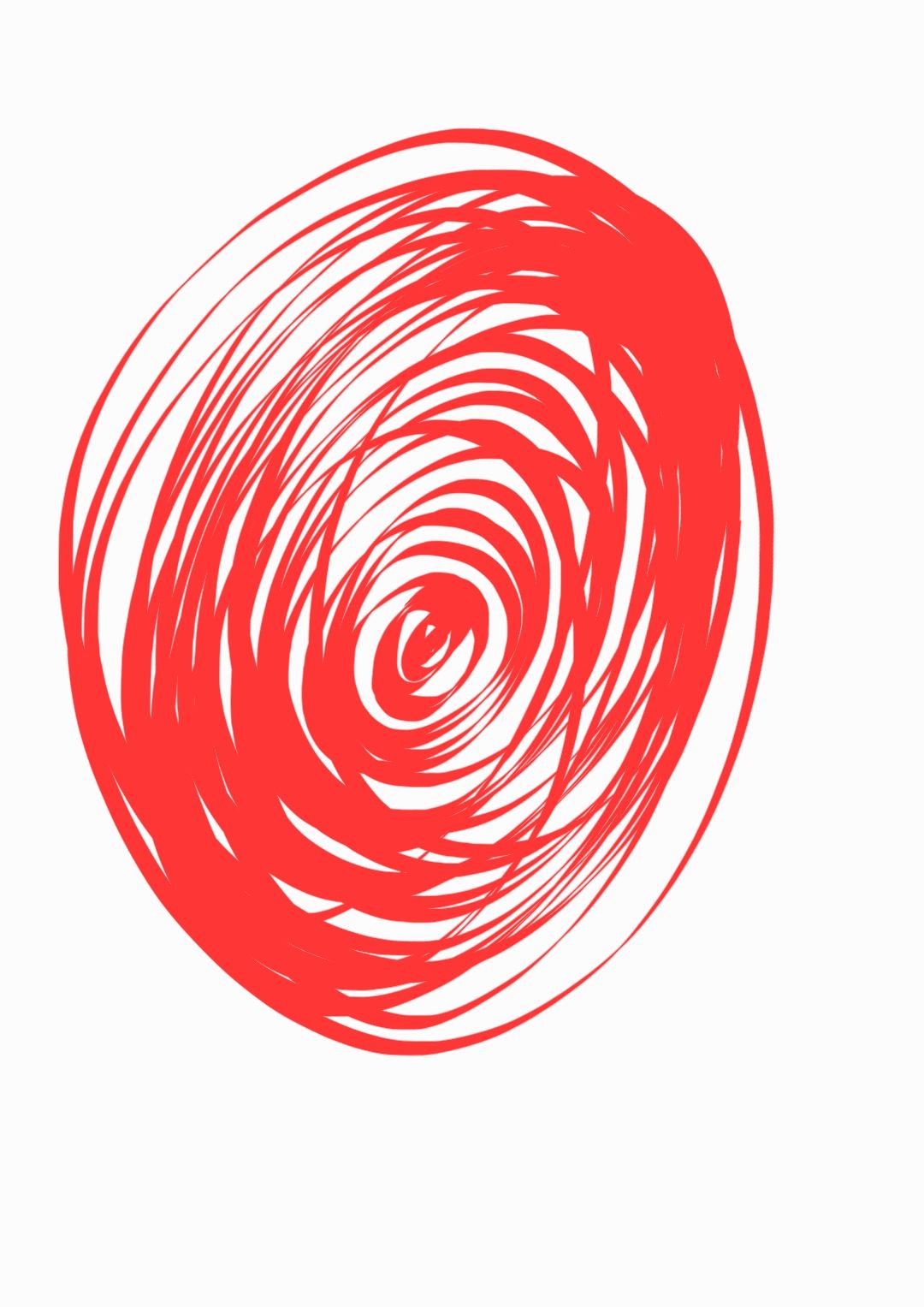
Now, back to that name. No, this platform wasn’t inspired by Chanel. It gets its name from my last job as the world’s first and only Sanity correspondent at a media startup, which was felled by Covid on January 1, 2021. For some time after I first discovered the news that I'd lost my job, I alternated between abject panic and sadness. It was the first time in my career that I was made redundant. I didn’t know how to process the twin blow of abruptly losing my life’s purpose and my livelihood.
But soon, something wondrous happened. I started getting messages like this.

I was still shocked and scared, but the outpouring of solidarity from my readers meant I could not give up on the vision of a new kind of mental health storytelling and community that we together dreamt of building.
I launched Sanity by Tanmoy as a weekly newsletter on Substack barely 10 days after losing my job. I was a tad gobsmacked when it grew to just shy of 2,000 subscribers from around the world and broke into Substack's top paid health-related newsletters – the only non-western name on their list – within 100 days of launch. Our community includes people with lived experience of mental illness, mental health professionals, researchers, policymakers, activists, advocates, and a lot of people interested in understanding mental health as a social justice and human rights issue.
In spring 2021, I was selected to be part of the Entrepreneurial Journalism Creators Program at Newmark Journalism School, City University of New York. One of the epiphanies I had during the course was that I had outgrown the newsletter format. I needed a full-fledged website. So here we are!
What will Sanity do?
Mental health is 'hot'. The media can't get enough of mental health stories (unfortunately, most of them are in the '7 ways to beat laziness and anxiety!' category). And venture capital firms are investing billions in search of apps and other tech mousetraps that can gain from the massive care gap left behind by traditional mental health care.
This exploding fascination for mental health is also evident in the mushrooming of columns, blogs, podcasts, webinars, and 'feel happy quick!' schemes. Every other movie or series now has a main character grappling with psychosis or at least garden-variety anxiety. The therapist’s clinic (or Zoom room) is the new gym. 'Mental-health enthusiast' is now an au courant Twitter bio (just like 'startup enthusiast' was in the halcyon days of Silicon Valley).
While the (seeming) democratisation of the mental-health conversation is fantastic news, it has also aggravated existing problems.
First, it has emboldened an obnoxious species whose only brief is to spread myths and fake news on mental health. You’ve seen them among your family, friends, colleagues, and Twitter trolls. They are easily identifiable by their urge to spew a variation of 'be a man' or 'snap out of it'. I call them 'uncles with unwanted opinion'.
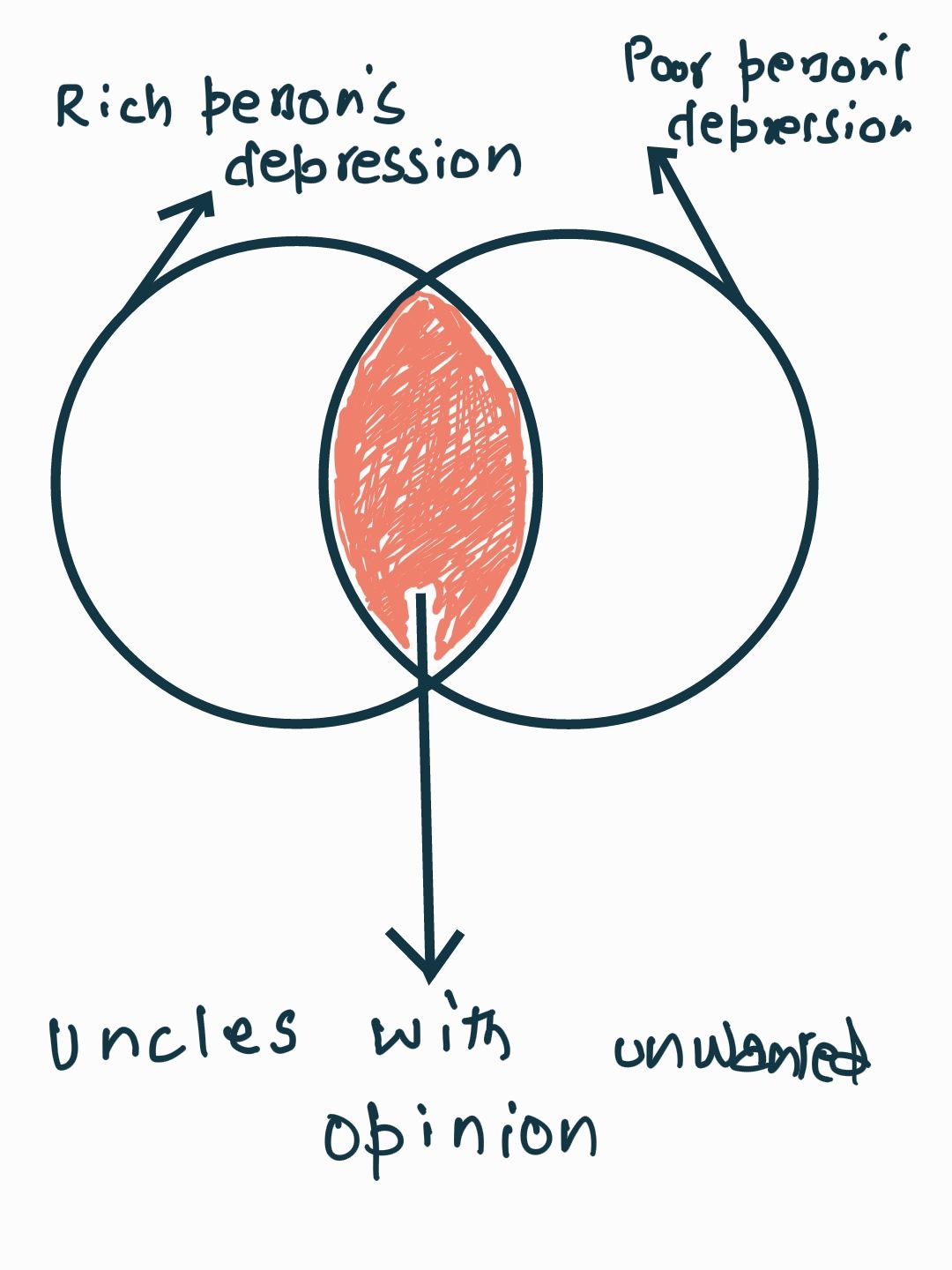
Second, despite all the excitement, the mental-health conversation is still shockingly biased in favour of traditional pockets of privilege. These are best exemplified by the walled gardens meant for specialists, such as psychology and psychiatry journals, mostly controlled by (white, male) western academics. They ignore the ground realities of the vast majority of the world’s population and remain stubbornly fixated with their WEIRD - western, educated, industrialised, rich, and democratic - heritage.
Finally, and as an offshoot of the above, the mental-health ecosystem remains wedded to the western biomedical model. The incumbent powers in the mental health ecosystem, none more muscular than Big Pharma, continue to undermine the social factors behind mental health problems and insist that they are simply a matter of 'chemicals in the brain'.
If the reason you are depressed or anxious is a malfunction in your brain - well then the burden to feel better is also fully yours. Society can pontificate about the wonders of meditation, mindfulness or goat yoga, and pretend that socially engineered evil like inequality, discrimination, or violence have nothing to do with why you feel like crap. It’s the perfect con.
Increasingly, first-person accounts of survivors are emerging as an antidote to this. But these stories are, by definition, intensely personal. Also, the spaces where they thrive, such as social media, aren’t open to or safe for those who are truly marginalised because of their caste, class, gender, sexuality, or other vulnerabilities.
There is an urgent need for a platform that will tell authentic, universal stories establishing the intersectional nature of mental health; marry the rigour of research with the soul of lived experience; and amplify ignored voices. This is what Sanity by Tanmoy will slowly aim to become.
Keywords: intersectional and slow
Mental health isn’t an island. It is intersectional, meaning it impacts everything and is in turn impacted by everything in your life. It is dynamic and is woven into your identity, and it changes with every change in your identity.
For instance, until recently I was a cis-het, upper-class, upper-class man in a patriarchal society. All things remaining constant, my vulnerability score was very low. But I just lost my job, which makes me a jobless man in a patriarchal society. Vulnerability: rising, but still not a patch on what anyone who doesn’t share my caste, gender, or sexual identity would be living with.
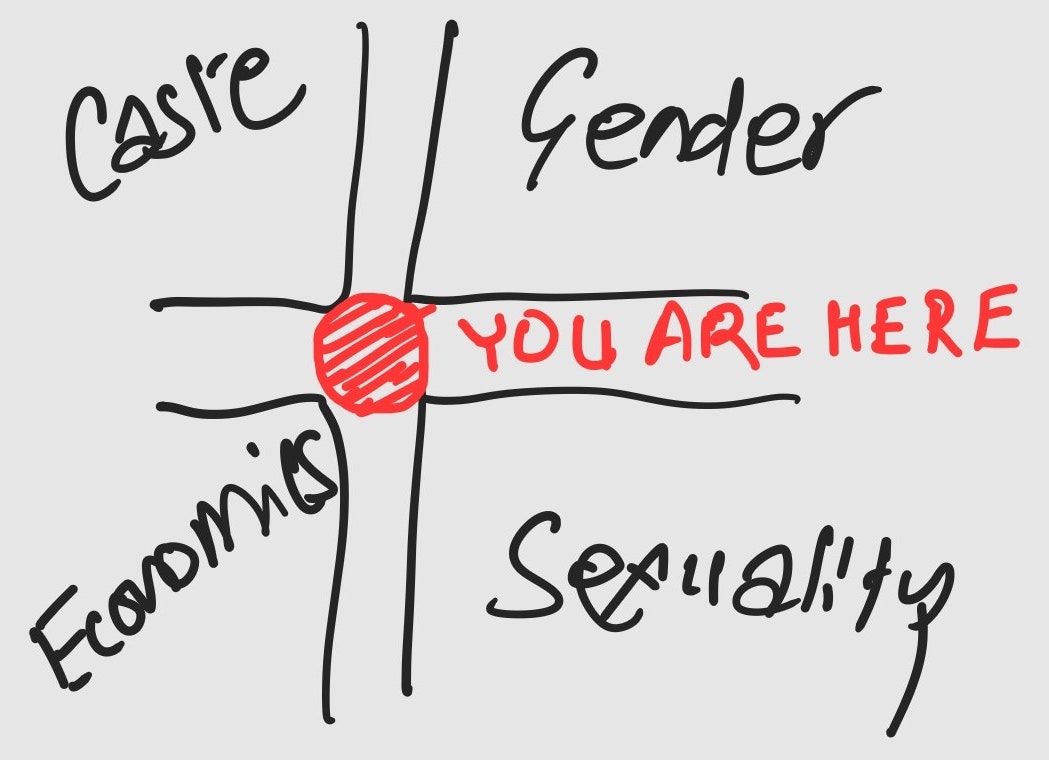
The other key word in my mission is slowly. I am not in the 'content' game. I will not pester you into paying attention by bombarding you with a story a day.
I am also keenly aware that content in English delivered via the Internet suffers from much of the same elitism that I critique. The last thing I want is for this platform to appropriate the stories and voices of those it seeks to serve. I want to collaborate and co-create, not do parachute storytelling.
This kind of work takes time, and is, at best, a risky experiment. Which is why I am a believer that readers and not conventional sources of funding (looking at you, advertisers) are my best allies.
What I mean when I say 'sanity'
I use the word sanity and not, well, mental health, because I feel the latter term has been hijacked by Big Pharma/wellness snake oil sellers/motivational Instagrammers. And that the real sweep of mental health far exceeds the narrow ambit of the health sector.
I hear mental health, and I expect to find a slick medical representative upselling the latest wonder drug for depression (and I'm not even a pill shamer, see line 1 of this post); or a lifestyle guru in a Rolex and a robe peddling the latest mindfulness trick; or an influencer asking me to smile, because 'smiling takes fewer muscles than frowning'.
Sanity is the guarantee that if our mind is sick, we will get the best possible care.
Sanity means knowing that we won't be fired at work because we 'can't handle it'.
Sanity is the right of the ill and their caregivers to scream at vote-seeking politicians, 'Give us a better deal, or else.'
Sanity means investing in prevention rather than cure.
Sanity means hope.
Sanity is the acknowledgment that there is no single 'you' and therefore no single, perfect formula for mental health.
Sanity is reversing the hierarchy of power that allocates low- and mid-income countries less than 20% of the share of the mental health resources, even though they are home to over 80% of the global population.
Sanity is weeding out racism ('depression is black'), sexism ('don’t cry like a girl'), and ableism ('crippled by anxiety') from our language.
Sanity is reparation for the harm done to marginalised communities.
Sanity is access to knowledge that lets anyone - not just doctors - locate the amygdala in the human brain and say, "Aha, so this is where my flight response is manufactured."
Sanity is questioning every pill you put inside your body.
Sanity is the comfort that a phase when you hate yourself and the world doesn’t make you weird. It makes you just like everyone else.
Sanity is hard-earned equilibrium in a world that resists it tooth and nail. I hope you will find our collective pursuit of it worthwhile.
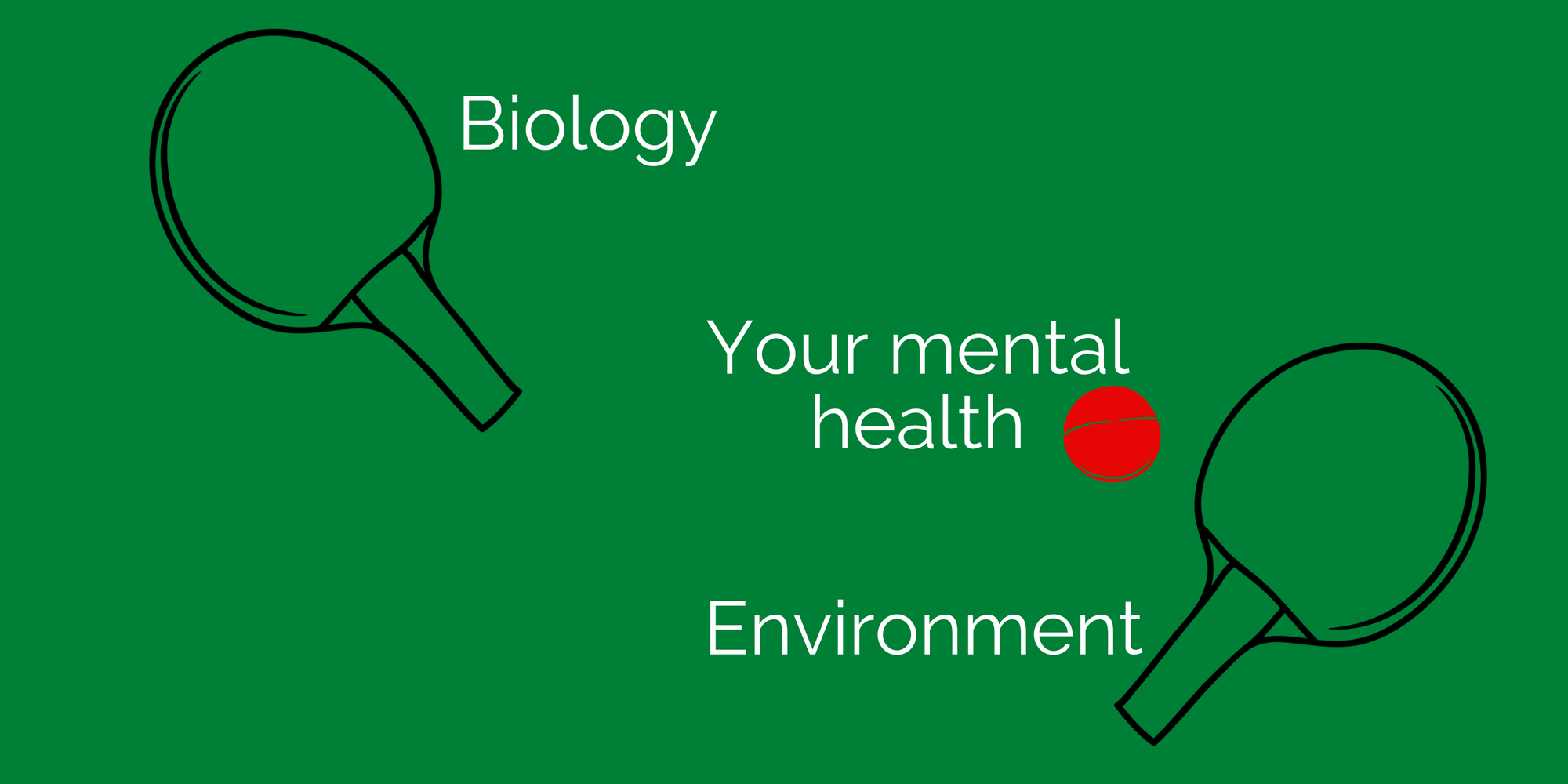
Like what you see? Would you please support my work by picking up a paid subscription?
I'd love to hear your thoughts on sanity. Connect with me on LinkedIn.
